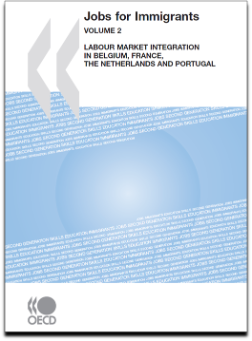Belgium
Jobs for Immigrants (Vol. 2): Labour Market Integration in Belgium, France, the Netherlands and Portugal
|
ISBN Number: 978-92-64-03617-8 Publication Date: November 2008 Pages: 334 |
Press release | Foreword | Table of contents
Integration policy for immigrants and their children is high on the policy agenda in many OECD countries. This is due to a number of factors. Firstly, many immigrants have arrived in OECD countries over the past decade, often for reasons other than employment. Facilitating their integration into the labour market has become a key policy priority. At the same time, many OECD countries expect that a greater recourse to immigrants may be necessary to tackle labour shortages in the context of demographic ageing. For this to be a feasible and sustainable policy option, immigrants have to be well integrated into the economy and society in the host countries. Labour market integration, in the sense of good employment and career prospects, plays a crucial role here. Finally, there is growing concern over the education and labour market outcomes of their children, who are now entering the labour markets in larger numbers. This volume, the second one in the OECD’s Jobs for Immigrants series, describes and assesses the experiences of four OECD countries (Belgium, France, the Netherlands and Portugal) with respect to the integration of immigrants and their children into the labour market. In this edition: • Chap I: Main findings on the labour market integration of immigrants and their children Labour market integration of immigrants and their children in: • Chap III: France • Chap IV: Netherlands • Chap V: Portugal
|
||
|
|
|
|||
|
|
|
|||
|
DID YOU KNOW... |
|
|
|
Readers can access the full version of the publication choosing from the following options:
|
Related Documents

 Belgium
Belgium  France
France  Netherlands
Netherlands  Portugal
Portugal  ...that low-educated immigrants tend to have higher employment rates than low-educated native-born?
...that low-educated immigrants tend to have higher employment rates than low-educated native-born?